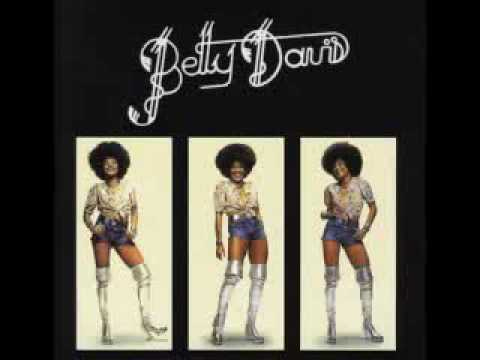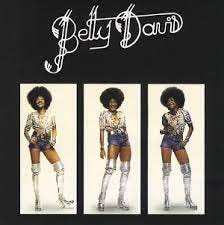During her brief recording career, Betty Davis – the singer, songwriter and record producer who died this week at 77 -- made several albums that rearranged and expanded the canvas of funk.
None were commercial “hits;” all of them resonated within the community of musicians, and thus became important to the conversation about Black music in the 1970s. Tons of artists – Stephanie Mills, Prince, Chaka Khan among them – drew inspiration from Davis, who married Miles Davis in 1968 and is credited with opening the jazz legend’s eyes to the psychedelic torrents exploding in rock at the time. (They divorced after a year.)
A magic-realist poet of the carnal, Betty Davis turned deep-groove one-chord jams into bold and often raucous celebrations of female desire. She was about the sensual moment and the raw-urge moment; her narratives explored the tensions between various forms of love and lust. And she wasn’t coy: She put desire up front, made it central to every aspect of her songs – you felt the heat at a distance, before the lyrics could even register.
The music Davis made when she was in Miles’ orbit – collected on the uneven The Columbia Years – shows the origins of her thinking as an artist, though there’s little of the assertive funk that would follow. It’s pre-history; the set contains tracks from two sessions that could have, with a bit more time and development, been the basis for her revolution. There are a few glimmers of outsized promise – see “Politician Man,” a cover of Cream’s “Politician” – alongside less-realized, more tentative pieces involving Hendrix’ last Experience rhythm section, Billy Cox and Mitch Mitchell, and members of the Bitches Brew band, among them Herbie Hancock, Larry Young, John McLaughlin and Wayne Shorter. Listening to its diffuse, meandering tracks, it’s impossible to escape the feeling: This was a missed opportunity.
Then came the three releases that defined Davis: Her self-titled 1973 debut, They Say I’m Different (1974) and Nasty Gal (1975). The first one is essential for its textures and contrasting moods, as Davis drops suggestive lyrics (“I’m wigglin' my fanny, I'm raunchy dancing”) within the crisp, relentlessly steady rhythm of bassist Larry Graham and drummer Greg Errico from Sly & the Family Stone.
Errico produced that album, and Davis produced everything that followed, including the intense vault discovery Is It Love Or Desire. Her studio process was simple: According to members of her band Funk House, she’d “score” the tunes on cassette, singing the specific parts she intended for each instrument. Recorded for Island Records at a studio in Bogalusa, Louisiana, the album was shelved after its completion. Accounts differ about what happened; Davis hints at some conflict with the label in the bitter lyrics of “Stars Starve You Know.”
From its clavinet-spiked opener through the vocal chorales of “Stars Starve You Know,” Is It Love Or Desire shows that Davis understood, and in some ways accelerated, changes in the rhythmic architecture of funk brought by Parliament-Funkadelic. The sessions took place shortly after Mothership Connection became a massive hit. Davis’ strongest moments here share Parliament’s sense of momentum, its conjoining of thick, heavy backbeats with irreverent quips and bliss-seeking refrains. Some tracks of Is It Love or Desire are big, opulent revues made for the stage; others are spare and minimal, exploring the pathways from sex to spiritual awakening in tones strikingly similar to those perfected by Prince.
It’s incredible to think that in 1976, during a pop-culture moment marked by doses of now-revered radio-friendly funk, Betty Davis’ Is It Love or Desire somehow got lost. And that missed moment, one of several in her career, wound up lasting decades. Makes you wonder what she could have done with even a tiny measure of support, recognition, encouragement.
Why yes, we have a fancy digital suggestion box. Share your favorite Underloved/Overlooked records here: echolocatormusic@gmail.com.
Please consider subscribing (it’s still free!). And…..please spread the word! (This only works via word of mouth!)





